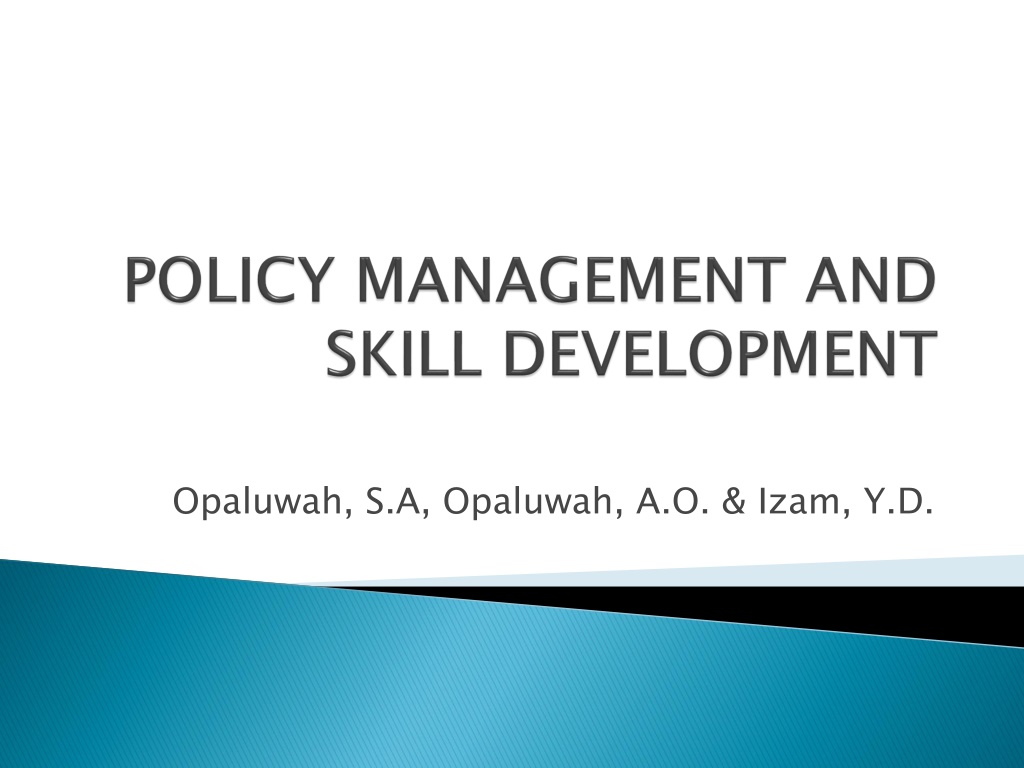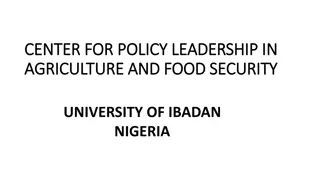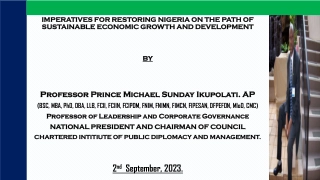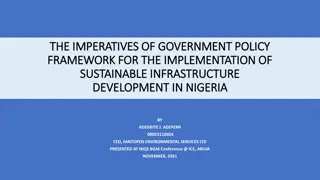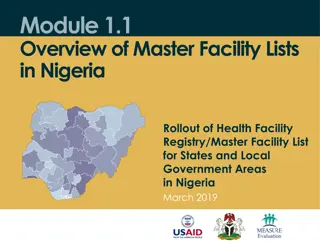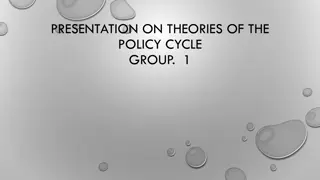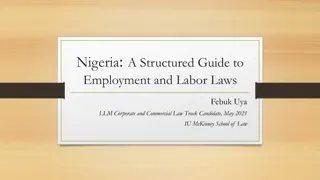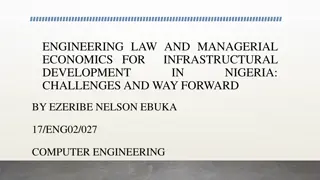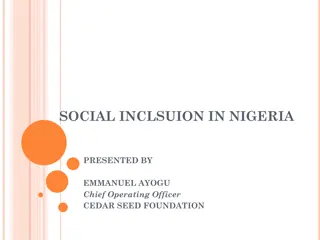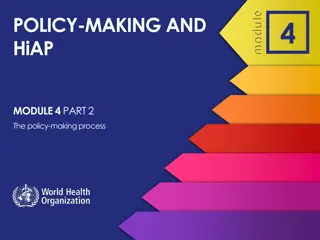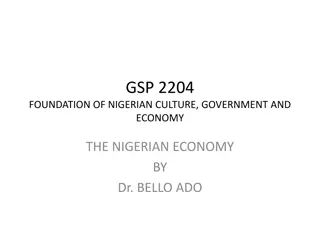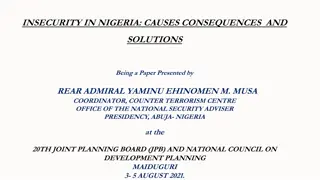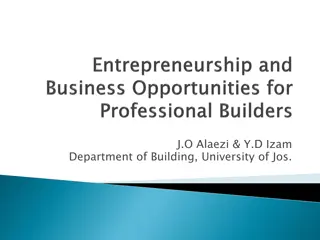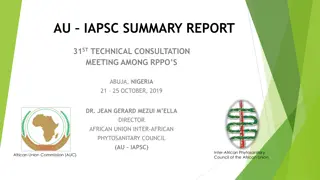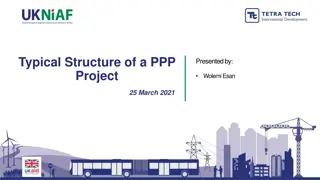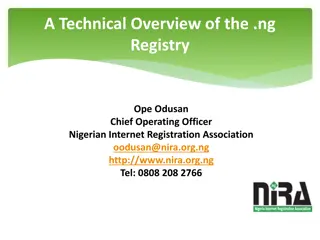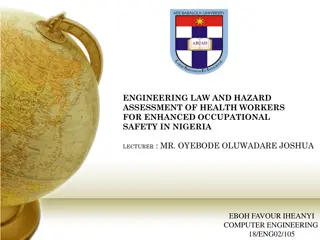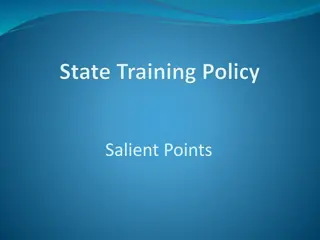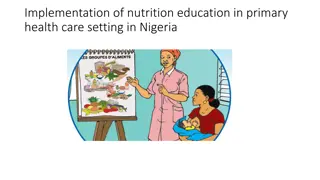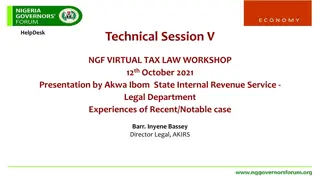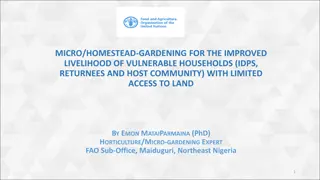Policy and Skills Development in Nigeria: A Comprehensive Overview
Delve into the intersection of policy and skills development in Nigeria through key concepts, definitions, and historical origins. Explore the significance of skill acquisition, employment data, and growth areas in demand. Discover the landscape of educational policies and the essential role of skill development policies in advancing societal progress.
Download Presentation

Please find below an Image/Link to download the presentation.
The content on the website is provided AS IS for your information and personal use only. It may not be sold, licensed, or shared on other websites without obtaining consent from the author. Download presentation by click this link. If you encounter any issues during the download, it is possible that the publisher has removed the file from their server.
E N D
Presentation Transcript
Three key concepts define the context of the Three key concepts define the context of the paper: paper: Policy Policy Skills Skills Policy and Skills Development in Nigeria Policy and Skills Development in Nigeria
Mayer & Thompson (1982) defined policy as a declaration that defines the intention of an individual, organization, community, or government s goals and priorities. Consideine (1994) defines Public policy as an action which employs governmental authority to commit resources in support of a preferred value. Public Policy cover a wide range of governance issues. Educational Policies as a relevant example.
Skills refer to competence acquired by an individual influencing employment and earnings (Adams, 2011) Cognative, Non-Cognative and Technical Skills Skill development does not only focus on formal education but also covers every form of informal education and the wide array of institutions and activities influencing the ability of the individual to accomplish a specified task Krugman (1994) argues that a country s ability to improve its standard of living over time depends almost entirely on its ability to raise its output per worker. Benefits of Skill Acquisition (Employment, Productivity, Profitability, National income).
o Skills development policies derive from the need to reorganize and then improve skills of the society through a conscious effort refinement.. o Historical Origins o TVET vs Apprenticeship system o The National Directorate of Employment o The Industrial Training Fund o Students Industrial Work Experience Scheme. o National Vocational Qualification Framework. of addition and/or
EMPLOYMENT DATA IN NIGERIA Employment Employment Sector Sector Farm Public Private Self-employment Unpaid family Others SOURCE: Male Male Female Female 64 7 3 13 1 11 WORLD BANK(2013) 61 4 2 16 5 12
Growth Growth Area Area Occupations in Occupations in Demand Demand Livestock Livestock Specific Specific Occupation Occupation Generic Generic Skills Skills 1. 1. Farm Farm Poultry Poultry farming farming Communications Communications Rearing Rearing Diary Diary farming farming Supervisory Supervisory Crop rotation Crop rotation Agriculture Agriculture Numeracy Numeracy Animal Husbandry Animal Husbandry ICT ICT Entrepreneurship Entrepreneurship Communications Communications 2.Services 2.Services Wholesale/Retail Wholesale/Retail Garment/Tailoring Garment/Tailoring ICT ICT Computer Computer programming programming Auto Auto- -mechanics mechanics Supervisory Supervisory Vehicle Repair Vehicle Repair Numeracy Numeracy Hairdressing Hairdressing ICT ICT Entrepreneurship Entrepreneurship Mechanics Mechanics 3.Hotel/ 3.Hotel/Restaurnt Restaurnt Catering Catering Cooks Cooks Communications Communications Supervisory Supervisory Hotel Hotel Supervisors Supervisors Numeracy Numeracy
Growth GrowthArea Area Occupation in Demand Occupation in Demand Specific Specific occupation occupation Generic Skills Generic Skills Communications Communications 4. Construction 4. Construction Masonry Masonry Electrician Electrician Supervisory Supervisory Carpenters Carpenters Brick making Brick making Numeracy Numeracy Electrical Installation Electrical Installation ICT ICT Entrepreneurship Entrepreneurship Scaffolding Scaffolding Welding Welding Bricklayer Bricklayer Carpenter Carpenter Communications Communications 5. Manufacturing 5. Manufacturing Food Food Processing Processing Food Preparation Food Preparation Supervisory Supervisory Light manufacturing Light manufacturing Metal Metal Fabrication Fabrication Numeracy Numeracy Carpentry Carpentry ICT ICT Entrepreneurship Entrepreneurship Furniture makers Furniture makers Structural Structural timber timber Boat Boat makers makers
Farm Farm (Livestock, Crop Rotation, Animal Husbandry, (Livestock, Crop Rotation, Animal Husbandry, Aquaculture) Aquaculture) Services Services (Wholesale, Retail, ICT, Vehicle Repair) (Wholesale, Retail, ICT, Vehicle Repair) Hotel/Restaurant Hotel/Restaurant (Catering, Hotel Management, (Catering, Hotel Management, Tourism) Tourism) Manufacturing Manufacturing (Food Processing, Light (Food Processing, Light Manufacturing) Manufacturing) Construction Construction (Electricians, (Electricians, Welding, Carpentry Welding, Carpentry over 50% of craftsmen over 50% of craftsmen) ) Masons, Scaffolding, Masons, Scaffolding,
Communications Supervisory Numerical Literacy ICT Entrepreneurship
More Policies? More Skills? More Synergy?
There is need for a reassessment of the quality of skilled and unskilled labour in Nigeria. NVQF commended. Craft Schools, Technical reintroduced and equipped to produce artisans, technicians and Professionals of the highest standard. Colleges and Programmes should be Organised Private Sector(OPS) to fund the institutions that produce these labour they need and utilise. In particular, the 2% education tax on company profit needs to be reassessed. A restriction on the excessive use of expatriates should be reviewed as this has seen the negligence of training of Nigerians and the use of foreign expatriates. Policies are also needed to protect organisations from outright losses that may arise in training of workers.
THANK YOU FOR LISTENING !!! THANK YOU FOR LISTENING !!!
